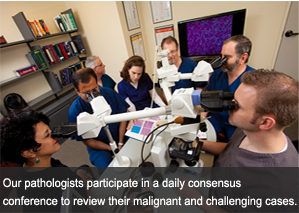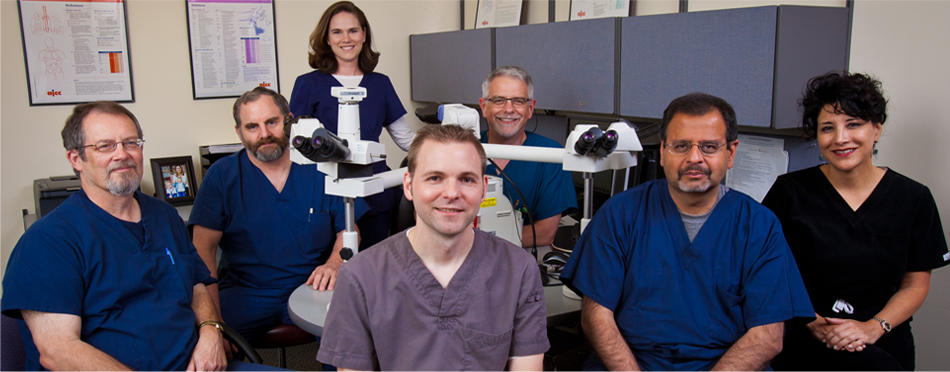
Pathologic examination of tissue specimens is the primary focus of our anatomic pathology department. We offer a comprehensive diagnostic evaluation of all tissue specimens with a state of the art histology lab that offers on site testing which includes immunohistochemistry.
Our pathologists have expertise in the areas of gastrointestinal pathology,breast pathology, surgical pathology and hematopathology. Medical autopsy services are provided to inpatients of Texas Health Plano Hospital, Texas Health Allen Hospital, Texas Health Flower Mound Hospital and Baylor Frisco Hospital.
Cytopathology involves analysis of disease processes through the microscopic study of individual cells and small groups of cells. Cytopathologic evaluations are appropriate for liquid specimens and fine needle aspiration samples.
Hematopathology involves the study of hematopoietic cells. This includes cells originating from the bone marrow, blood, lymph nodes, spleen and thymus. Our board certified hematopathologists frequently evaluate peripheral blood smears, bone marrow biopsies and aspirates, and lymph node biopsies to classify hematopoietic diseases.
Special testing available includes: flow cytometry, cytogenetics, FISH testing, and molecular studies.

We at MD Pathology are proud to announce that we are the first laboratory in the United States to offer 10 simultaneous color flow cytometric analysis of blood, bone marrow, and tissue samples for clinical use.
Our 10 color flow cytometry testing offers superior sensitivity to detect abnormal cells in small samples. This cutting edge technology enhances accuracy and can decrease the need for additional testing.
Fine Needle Aspiration (FNA) Clinic
The pathologists at MD Pathology are trained in performing fine needle aspiration of palpable masses. This procedure can be performed on an outpatient basis in the MD Pathology suite, or at the bedside for hospitalized patients. FNA appointments are available Monday through Friday and can be scheduled by calling 972-981-3107.
There are advantages for both the patient and the requesting physician when the pathologist performs the FNA procedure. Theses include:
- Application of special training skills in fine needle aspiration and preparation of cytology smears, both very crucial in obtaining the most optimal specimen for interpretation.
- Immediate assessment of specimen adequacy, preventing delays in diagnosis.
- Optimal results achieved through personal examination of the lesion in combination with microscopic evaluation of the sample.
- In most instances, a preliminary verbal diagnosis is provided within an hour of the procedure, followed by a written report the following work day.

